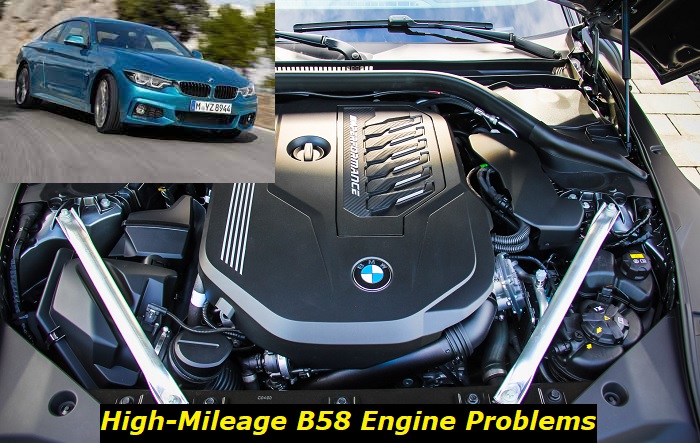The legendary B58 engine has been made in Bayern, Germany, since 2015. This is one of the most recognizable modern engines made by BMW. The engine is perfect for the majority of drivers who love BMW. Yes, it still has some serious common problems and today we'll concentrate exactly on them to let you know what you should expect from a high-mileage B58 engine.
A high-mileage B58 powerplant from BMW will most likely have problems with VANOS, Valvetronic, turbocharger, timing chain, and overall reliability. The engine has a lot of flaws and they will reach their peak at about 200,000 miles, so anything higher than that is considered a taboo mileage for buying a BMW powered with the B58 engine.

Key facts and my opinion about the engine
- Production years: 2015-now
- Average lifespan of B58: 180,000-200,000 miles
- Fuel supply type: direct injection
- Power range: 326-388 hp
- Fuel efficiency: average
- Engine block material: aluminum
- Engine reliability score: medium
- The most common problems: coolant level mysteries, head gasket failure, carbon buildup on intake valves, VANOS issues.
What are the key facts about the B58 engine?
I've already written about this engine in my article about the 3-Series M340i. You can have a look. But keep in mind that the B58 engine was changed quite a lot in 2018 and not everything in that article will suit all models of this powerplant.
So, this engine has been made since 2015. It has been installed in all sedan and hatchback cars starting with the 1-Series and up to the 8-Series. Also, it was used in the Z4 and almost the entire lineup of SUVs: X3, X4, X5, X6, and X7. The engine is used with rear- or all-wheel drive with different types of transmissions.
This is a great machine and I would love it if BMW made more of such technologies instead of those crappy small engines that live several years and then die (after the warranty is over).
So, here's what you should know about the B58 engine:
- this is a 3-liter 6-cylinder in-line engine with 24 valves and an aluminum block and head, it has a special coating in its cylinders to prevent premature wear;
- the engine can develop 326 to 388 horsepower in different versions, also it is capable of delivering up to 370 lb-ft of torque;
- the engine is turbocharged, it has the Bosch / Mahle turbocharger;
- the direct injection is offered - quite an efficient way to inject gasoline into the combustion chamber but with an unpleasant surprise of carbon buildup;
- it has VANOS phasers on both camshafts and also a Valvetronic system to operate valves in the needed time;
- also, it has hydraulic lifters and you will not need to adjust the valves;
- the engine has two timing chains up to 2018 and one chain in newer versions.
Many experts call this engine the best BMW engine ever made. But I don't agree with that. Although the B58 is not a bad machine, this is certainly not better than many older engines made by this company. It still has quite a lot of common issues and forums are full of reports about minor problems that are hard to locate and solve.
The B58 is not the most fuel-efficient engine at all. In the 3-Series, you will average about 25 MPG while the X7 will go about 20 MPG, on average, in real life. The BMW-estimated gas mileage will obviously be more optimistic. But you aren't likely to drive your 3.0L Turbo BMW with the speed of an average snail.
What's the high mileage for the B58 engine?
Now, before we continue, I would like to set the borders of high mileage. The B58 engine in your BMW will most likely go about 200,000 miles if maintained well. Driving it further than that is possible but very often expensive. So, everything between 150,000 and 200,000 miles is considered high mileage for the B58 engine.
Why do I say that it will only go 200,000 miles? Well, after that, the coating in the cylinders is gone, and the block is not protected anymore. Also, the VANOS and Valvetronic are torturing you with their awful work and the head is contaminated with all kinds of buildups that are impossible to clean. Driving such an engine is not a good idea - it will not be powerful and efficient.
Also, the turbocharger will likely need replacement at 200K miles. The chain will be rattling heavily and may even jump. After it reaches 200K miles, it should be sold as soon as possible. Of course, this is just my opinion and you may take a risk.
What are some common high-mileage problems with the B58?
Today, I will only concentrate on high-mileage problems so that you know what to expect if you buy a BMW powered by this engine. Or you will understand where is the point when you should sell the B58-powered car you now have in your garage.
So, here are the high-mileage problems to be aware of:
1. Timing chain problems
There were two timing chains up to 2018 and then BMW updated the system and installed the single chain. Both versions will develop problems at about 100,000 miles or a little later. First, you will hear some very silent rattling noise from the engine when idling or driving at high RPM on highways. After that, the chain may jump or break.
The problem is in the chain itself which stretches faster than BMW expects it to stretch. And the tensioner just can't compensate for this. As a result, you may get problems with valves and pistons, so it's better to replace the chain kit once the engine starts rattling. I recommend replacing the chain kit in the B58 engine at 100,000 miles.
2. VANOS and Valvetronic
Surprisingly, the VANOS cam timing system will not bother you much in this engine up to 120,000 miles or so. But after that, the classic BMW problem will start developing. It will most likely get on your nerves pretty regularly even if you replace the VANOS solenoids after it fails for the first time.
Experts have different theories of why this happens. In most cases, they agree that VANOS solenoids are not lubricated well because of clogged oil lines or some other reasons. As a result, they stop working and need cleaning and maintenance quite often.
3. Mysterious coolant level drop
I believe there is a problem with the coolant reservoir cap in the older B58 engine. If you notice that the coolant level drops slowly, you should buy a new cap and install it. Without this, the coolant will slowly leak through the cap and sooner or later the engine may overheat.
4. Overheating and head gasket failure
This is a hot engine, so the head gasket is at risk of failing at all times. But in older engines that lost their cooling efficiency the head gasket may fail pretty regularly. You will notice the smell of burned oil and very often the tailpipe will be emitting large amounts of smoke.
The head gasket itself doesn't cost a lot but the labor will be surprisingly expensive. Repairing anything in this engine will cost you a lot of money because of labor costs.
5. Valve contamination
Carbon buildup is the standard problem for all direct-injected engines. But the B58 develops buildups that are extremely hard to clean. Over time, these buildups cause harsh engine work, power loss, uneven idling RPM, and overall loss of efficiency and you can't do anything with that.
6. Turbo failure
The Bosch / Mahle turbocharger is not really huge here and it shouldn't fail too early. But it will still experience problems with lubrication, just like VANOS solenoids, and will most likely fail after 150,000 miles.
This is another serious and expensive problem. Repairing the turbocharger is not always possible at this mileage. But replacing it will cost you a huge amount of money.
Where to look when buying a used B58?
If you are buying a used BMW with the B58 engine under the hood, you should check the car properly. You better take it to the dealership and check the maintenance records. If the car wasn't maintained properly, you shouldn't buy it - no one knows how many miles it can go before fatal failures.
Here are some important things to pay attention to:
- smoothness of work in idle - if RPMs are dancing around 800, the engine already has problems;
- smoke from the tailpipe - rev up the engine to 3000 RPM and look at the pipe, it shouldn't emit any visible smoke;
- vibrations - the B58 naturally vibrates a little because it doesn't have balance shafts but the vibrations shouldn't be annoying in the interior;
- leaks - carefully look for any leaks on the engine, transmission, and especially around the turbocharger;
- codes - use the scanner to read all the possible codes to understand what is now happening with the engine.
Also, you may need to test drive the car before you agree to buy it. If you feel that there is not enough power in the vehicle, avoid buying it. Any underperformance is a serious concern in this engine and it may mean that soon you will need to invest in expensive repairs.
I don't recommend buying a BMW with the B58 engine that has more than 150,000 miles on it. You may only do that if the price is super-lucrative.
Final thoughts
I believe the B58 engine is one of the solid BMW products and it can be a wonderful purchase when new. But buying it used is a very tricky decision. You may pay quite a lot of money and get an engine that is about to die. Its durability completely depends on the quality of maintenance and service.
If you are going to buy the B58-powered BMW with over 150,000 miles on the odometer, you should think twice. Such a purchase may take thousands of dollars from your pocket on repairs within the following year.
About the authors
The CarAraC research team is composed of seasoned auto mechanics and automotive industry professionals, including individuals with advanced degrees and certifications in their field. Our team members boast prestigious credentials, reflecting their extensive knowledge and skills. These qualifications include: IMI: Institute of the Motor Industry, ASE-Certified Master Automobile Technicians; Coventry University, Graduate of MA in Automotive Journalism; Politecnico di Torino, Italy, MS Automotive Engineering; Ss. Cyril and Methodius University in Skopje, Mechanical University in Skopje; TOC Automotive College; DHA Suffa University, Department of Mechanical Engineering






Add comment